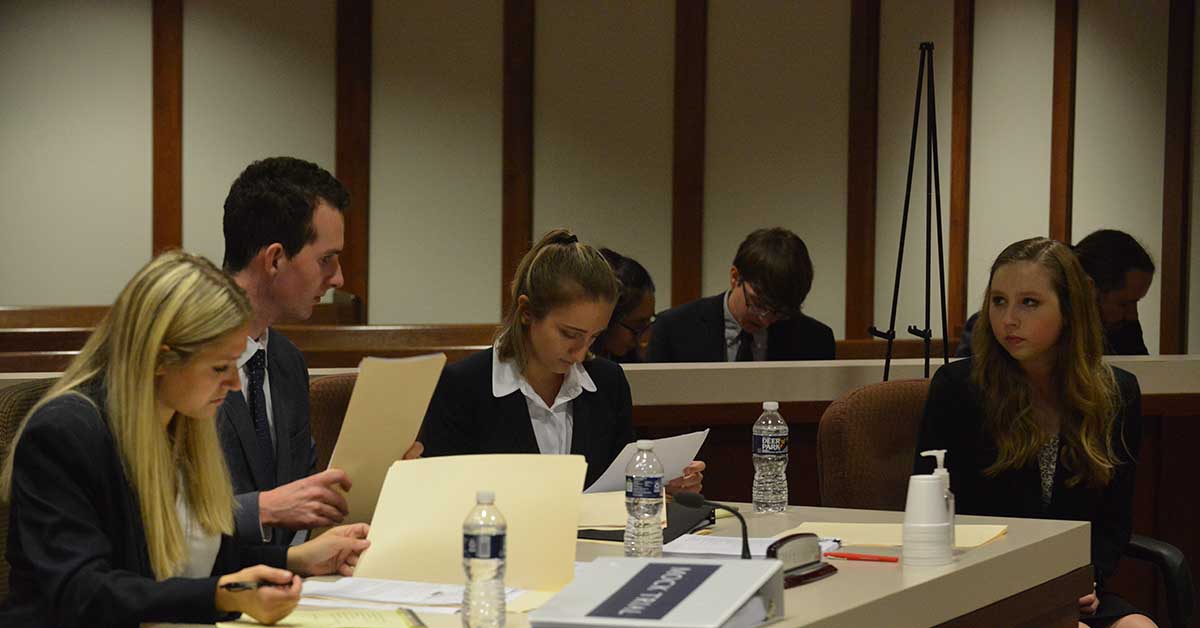REQUIRED COURSES
Take the following courses:
SO-101 Introduction to Sociology
3 CreditsS
PS-101 Introduction to U.S. Government
4 CreditsS, WK-SIPre- or Co-requisite: FYC-101
PL-106 Introduction to Ethics
4 CreditsH,SW-ER
CJ-260 Introduction to Criminal Justice
3 CreditsS
SO-302 Social Deviance and Criminology
3 CreditsSPrerequisites: SO101 or AN151.
CJ-360 Policing in the United States
3 CreditsPrerequisite: CJ-260 or SO-260
CJ-370 Crime & United States Court System
3 CreditsPrerequisite: CJ-260 or SO-260
CJ-380 U.S. Correctional System
3 CreditsPrerequisite: CJ-260 or SO-260
MINORITY EXPERIENCES
Take one of the following courses:
3 CreditsSW-US CM-210 Race and Language in the United States
PY-211 Race, Ethnicity, and Identity Studies
3 CreditsS,WK-SIPre- or Co-Req: FYC-101 or EN-110 or EN-109.
EN-203 Class/Status/Identity in US Literature
4 CreditsSW-LEPrerequisite or corequisite: FYC-101 or EN-110 or EN-109
EN-217 Disability in Fiction
3 CreditsH
EN-237 Constructing Identities
4 CreditsCAPrerequisites: EN110 or EN109.
PS-206 The Culture War
4 CreditsCA, S, SW-USPre- or co-requisite: FYC-101 or EN-110 or EN-109
SO-203 Minority Experiences
3 CreditsSPrerequisites: SO101 or AN151.
EN-392 Crossing the Border
4 CreditH,CW,SW-USPrerequisites: FYC-101 or EN-110 or EN-109
METHODS REQUIREMENT
Take the following courses:
SW-214 Integrated Research Methods & Stats I
3 CreditsS,WK-SI
SW-215 Integrated Research Methods & Stats II
3 CreditsS
ELECTIVES
Take 6 or more credits from these designated subject/areas below:
3 CreditsCW, S, SW-ERPrerequisite: FYC-101 3 CreditsSPrerequisites: SO101. 4 CreditsSPrerequisites: SO101 or permission of instructor. 3 CreditsS,WK-SIPrerequisites: FYC-101, EN-110, or EN-109. 2 CreditsSCorequisite: SW331. Prerequisite: SW230. 4 CreditsSCorequisite: SW330. Prerequisite: SW230. 3 CreditsSPrerequisite: SW-231 3 CreditsS 3 CreditsS,WK-SIPre-Req or Co-Req: FYC-101 or EN-110 or EN-109 3 CreditsCW,S,WK-SI 3 CreditsS, WK-SIPrerequisite or Corequisite: FYC-101 1-3 CreditsS 3 Credits 3 CreditsS 4 CreditsCONN 3 CreditsS 3 CreditsSPrerequisite: PY101.CJ-362 Juvenile Justice
SO-244 Drugs and Society
SW-230 Introduction to Social Work Practice
SW-231 Social Problems & Social Welfare
SW-330 Social Work Practice: Individual, Family & Small Groups Laboratory
SW-331 Social Work Practice: Individual, Family & Small Groups
SW-333 Social Welfare Policies and Services
SO-243 Death & Dying
SW-221 The Life Cycle
SW-241 Children, Youth, and Family Services
PACS-105 Introduction to Conflict Resolution
PACS-108 Mediation
PY-190 Introduction to Poverty Studies
PY-312 Cultural Psychology
CONN-360 Criminalistics
PY-205 Social Psychology
PY-203 Abnormal Psychology
CAPSTONE
Take 6 credits from the following courses:
SO-401 Sociology Senior Seminar
3 CreditsSPrerequisite: Senior standing.
CJ-490 Criminal Justice Internship
2-9 CreditsCorequisite: CJ-495
CJ-495 Internship Seminar
2-6 CreditsCorequisite: CJ-490
SO-401 Sociology Senior Seminar
3 CreditsSPrerequisite: Senior standing.
CJ-490 Criminal Justice Internship
2-9 CreditsCorequisite: CJ-495
CJ-495 Internship Seminar
2-6 CreditsCorequisite: CJ-490
POE Credit Total = 47
Students must complete at least 18 credits at the 300/400-level. Any course exception must be approved by the advisor and/or department chair.
 skip to content
skip to content





